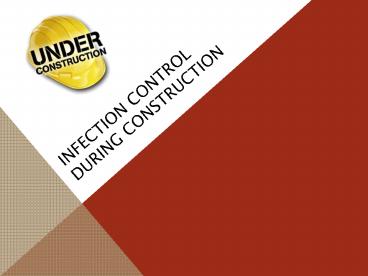Infection Control During Construction - PowerPoint PPT Presentation
Title: Infection Control During Construction
1
Infection Control During Construction
2
The Goal
3
Construction Team
- The construction teams goal is to get the job
done! - Contracts have to be followed.
- Deadlines have to be met.
- Coordinate sub contractors.
- Supply management.
- Follow Safety standards.
4
Objectives
- Role of Infection Control
- What infections have occurred related to
infection? - Infection Control Risk Assessment.
- The 5 priorities of Infection Prevention in
Construction
5
Infection Controls role
- The main goal of infection control is to protect
patients, staff and visitors from healthcare
associated infections. (HAIs)
6
Why do we need Infection Control?
- There are many documented cases of healthcare
associated infections traced back to
construction. - When those construction projects were going on it
was never the plan to cause someone to get an
infection. - All construction projects bring risk.
7
Documented Aspergillus Infections
8
Documented Aspergillus Infections
9
Documented Aspergillus Infections
10
Documented Aspergillus Infections
11
It Takes us all to Do the Job Well
- Construction Team
- Construction Lead
- COR
- Construction Safety
- Team
- Infection Control is part of the Safety Team.
- Dont wait for IC to fix the deficiency.
- Safety requires all of us to be attentive to
areas of risk.
12
Its mostly about the Dust
13
Aspergillus
- Asperillus is a fungi.
- The spores can live for extended periods.
- Some of the places it is found in during
construction - Improperly functioning HVAC
- False Ceilings
- Acoustic Ceiling tiles
- Damp wood building materials
- Elevator shafts
14
Who is at Risk?
- For healthy individuals you will see allergic
reactions, sinusitis and mild bronchitis. - For high risk patients that are immune
compromised, It can be pneumonia or abscesses of
lung, brain, liver, and skin and wound infections - Patients have died from these infections.
- We have high risk patients in our hospital every
day!
15
Aspergillus infections
16
It can be about the water too
- Legionella bacteria have been isolated from soil
and dust but are typically associated with
aquatic environments. - Typical water sources in hospitals supporting
colonization with Legionella bacteria are cooling
towers, evaporative condensers, heated potable
water systems, and heating and air conditioning
systems. - During construction and renovation processes,
water systems are often disrupted.
17
What needs to be Done?
- ICRA Infection Control Risk Assessment
- The ICRA should be completed by Infection
Control, the COR and Construction lead before any
work starts! - It is signed and posted at each worksite.
18
Start with the Project
19
ICRA Step Two
20
ICRA Step Three
21
Guidelines are listed by class
22
Guidelines listed by Class
23
Guidelines Listed BY class
24
Other Considerations
- Are there other risks like patient/visitor
traffic nearby? - Waste removal route?
- Potential for water damage concerns?
- Utility outages
- Types of barriers and containment measures need
to be clearly discussed.
25
Five areas of Concern
26
Containment of the Job Site
27
Containment of the Job Site
28
Containment of THE JOB site
- Type of Barrier decided by
It must be sealed to the deck. - Length of time of project.
Dust travels!
29
Construction Breaches in our Facility
- Patient consult room only protected by a drop
ceiling while major demo was going on.
- Opened to ceiling of our new Cardiology area
30
Construction Breaches in our facility
- Construction Dust was found in a dental supply
storage room adjacent to the construction site. - Barriers were applied after the breach was
discovered but it was not completely sealed.
31
Exterior Construction Containment
32
Containment of the Job Site
33
Entry and Egress
34
Class IV projects require an anteroom
- Aa
-
35
Containment and Transport
- The cover must be taped if it is not solid.
- It is important to clean the outside of the cart
to prevent contamination outside of the job site.
36
Containment and Transport
37
Decontamination for the Crew
- It is for the safety of the patients that you do
not carry construction dust on your clothing or
equipment out into the hospital.
38
Decontamination for the Crew
39
Clean Up the Work Site
- Garbage must be taken out at the end of the work
day.
40
Our Patients and Families Thank You!
41
References
- http//www.ashe.org/advocacy/organizations/CDC/pdf
s/assessment_icra.pdf - http//www.hpsc.ie/A-Z/Respiratory/Aspergillosis/G
uidance/File,896,en.pdf - http//r.search.yahoo.com/_yltA2KIo9RpADtVEzwAVPO
RnIlQ_yluX3oDMTByM2Jic2xkBHNlYwNjZC10aHVtYgRzbGs
Dc25vYgR2dGlkAw--/RV2/RE1429958889/RO10/RUhttp
3a2f2fwww.veoh.com2fwatch2fyapi-R2xd5JW1thE/R
K0/RSBSANcTHG524oXFGVnJcgKdRmWyc- - https//www.emlab.com/s/sampling/env-report-02-201
2.html































